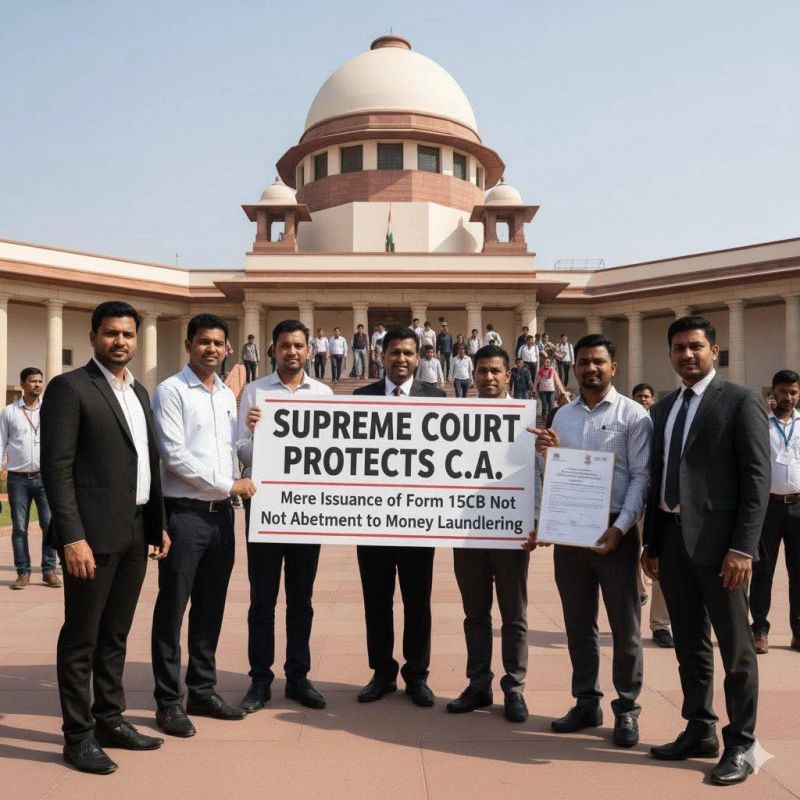SC Protect CA on Issuing 15CB abetting offence Under PMLA

Supreme Court Protects Practicing Chartered Accountant: Issuing Form 15CB Not Abetment of Money Laundering
The petitioner, K. Murali Krishna Chakrala, a practicing Chartered Accountant, was prosecuted by the Enforcement Directorate (ED) under the Prevention of Money-Laundering Act (PMLA), 2002, for issuing five Form 15CB certificates to M/s B.K. Electro Tool Products, alleged to have made bogus import remittances through fictitious accounts. The ED claimed that such certification constituted “knowingly assisting” under Section 3 of PMLA.
The Supreme Court has upheld a landmark decision of the Madras High Court, ruling that a Chartered Accountant (CA) cannot be held liable for abetment of money laundering merely because he issued Form 15CB under the Income Tax Act, 1961. In this case, the CA had certified Form 15CB for certain foreign remittances made by a company towards the import of goods. Subsequently, the Enforcement Directorate (ED) alleged that the company had illegally transferred funds abroad and accused the CA of abetting the offence under the Prevention of Money Laundering Act (PMLA).
The Madras High Court, while granting relief, observed:
“A Chartered Accountant is not required to verify the genuineness of documents submitted by clients. His role is akin to that of a panel lawyer of a bank who gives a legal opinion on title deeds without investigating their authenticity. Such professionals cannot be prosecuted along with the principal offender.”
The Supreme Court, in The Deputy Director v. Murali Krishna Chakrala SLP (Criminal) Diary No. 8123/2024, affirmed this reasoning, holding that the CA’s act of issuing Form 15CB a procedural certification under the Income Tax Act does not amount to participation or abetment in money laundering activities. Analytical Commentary are mention here under :
Professional Duty ≠ Criminal Liability : The Supreme Court’s order reinforces that a CA acting bona fide under statutory provisions like Form 15CB cannot be held liable under PMLA without evidence of mens rea or “knowing assistance.”
Boundary of Professional Liability : The judgment protects professionals from being criminally implicated merely for compliance certifications under fiscal laws.
Limiting Regulatory Overreach : The ruling aligns with the broader judicial approach that anti-laundering laws target offenders, not professionals performing regulated duties in good faith.
This ruling provides important judicial protection to professionals discharging statutory duties under fiscal laws, reaffirming that compliance-related certifications do not automatically imply complicity in the underlying client transactions.

“Professional certification under fiscal law cannot be criminalised unless there is conscious participation in laundering.”
This precedent provides welcome clarity and comfort to the professional community, affirming that Form 15CB certification made in good faith is not an act of abetment under PMLA.
References: Murali Krishna Chakrala v. The Deputy Director, Directorate of Enforcement, Chennai [2023] (Madras HC) & The Deputy Director v. Murali Krishna Chakrala — SLP (Criminal) (Supreme Court)
**********************************************************
If this article has helped you in any way, i would appreciate if you could share/like it or leave a comment. Thank you for visiting my blog.
Legal Disclaimer:
The information / articles & any relies to the comments on this blog are provided purely for informational and educational purposes only & are purely based on my understanding / knowledge. They do noy constitute legal advice or legal opinions. The information / articles and any replies to the comments are intended but not promised or guaranteed to be current, complete, or up-to-date and should in no way be taken as a legal advice or an indication of future results. Therefore, i can not take any responsibility for the results or consequences of any attempt to use or adopt any of the information presented on this blog. You are advised not to act or rely on any information / articles contained without first seeking the advice of a practicing professional.